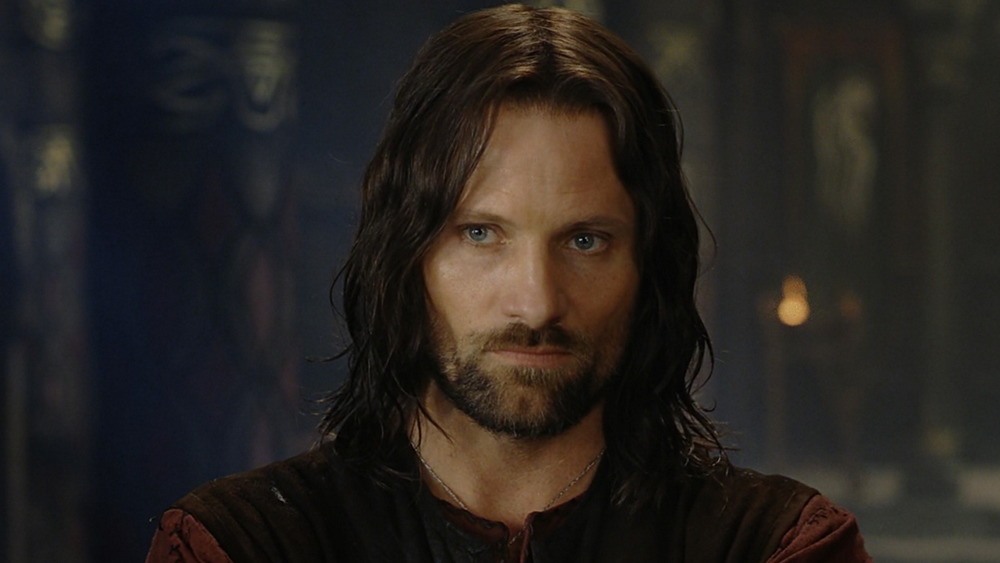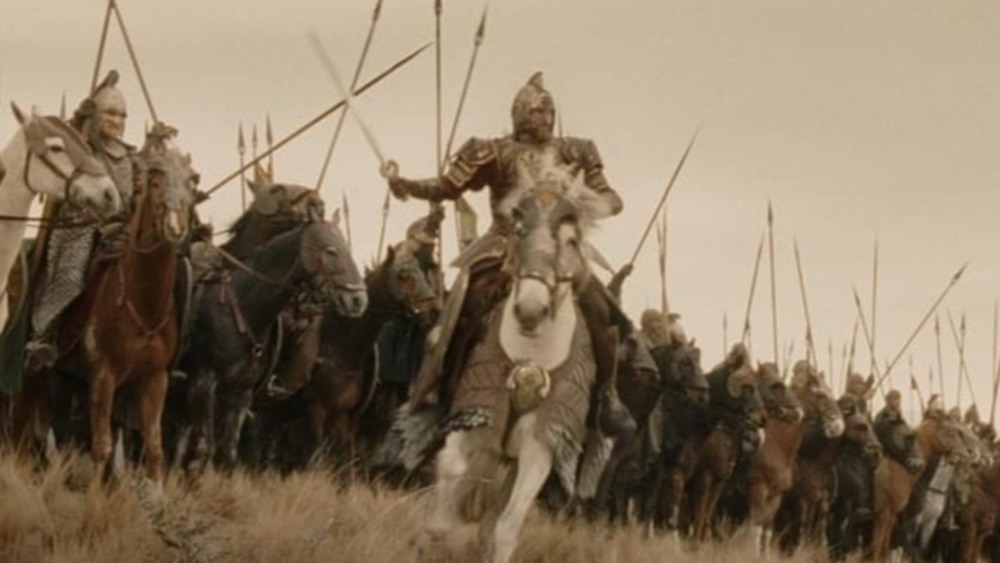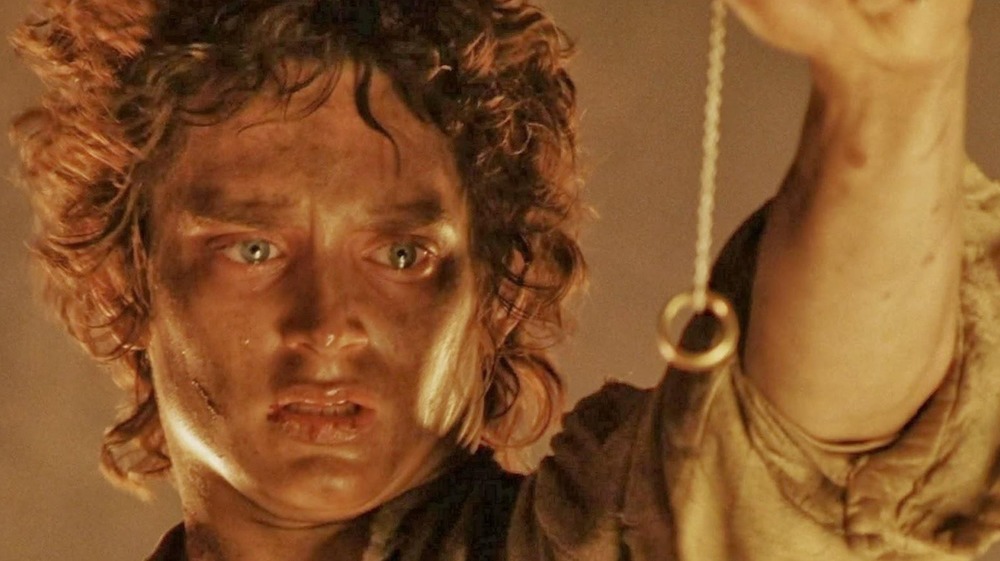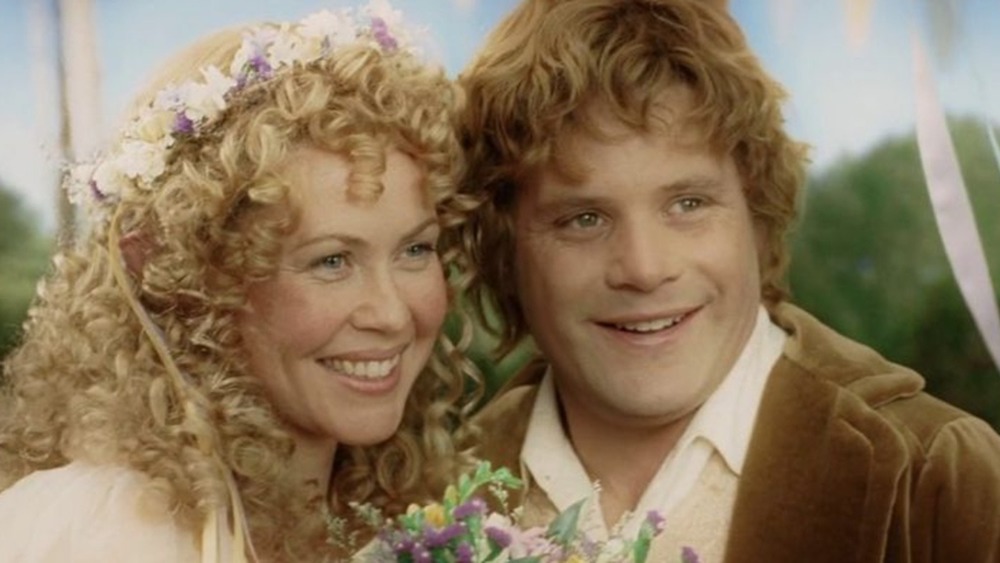Why Return Of The King Is The Best Of The Lord Of The Rings Trilogy
With the twentieth anniversary of The Lords of the Rings: Fellowship of the Ring on the horizon, now is as good a time as any to take a look back at director Peter Jackson's groundbreaking series. Based on the late J.R.R. Tolkien's novel, that later developed into an entire trilogy, the franchise still stands as a landmark piece of media, especially in the fantasy genre. It took a brand of film that commonly fell into the "campy" or "childish" category among mainstream critics, and reinvented it as a form of legitimate art — grossing just shy of $3 billion and securing countless awards along the way.
Unlike The Hobbit films — Jackson's maligned prequel trilogy loosely based on Tolkien's earlier work — the original trilogy comprised of Fellowship of the Ring, Two Towers, and Return of the King still receive endless praise and reverence across the board. While some viewers might find the odd installment a bit slow or uninteresting, their individual strengths make it difficult to pick out a weak link between the three. However, that's not to say that there isn't a standout among them that deserves recognition as the best of the best — that being Return of the King.
Here's how this conclusion to the influential Lord of the Rings saga one-upped those that came before it.
The action in Return of the King is incomparable
First and foremost, when discussing the Lord of the Rings, one cannot simply gloss over the incredible action sequences each film boasts. Whether it's a duel between Middle-Earth's fabled wizards or a Rohan's military force holding out against a horde of ruthless Uruk-hai, the series knows no limitations in this regard. While Fellowship of the Ring and Two Towers certainly deliver in this department (the escape from the Mines of Moria and the Battle of Helm's Deep come to mind) Return of the King really went all-in to ensure the trilogy went out with a bang.
While it contains the odd skirmish here and there, the two largest action set pieces are Sauron's siege of Minas Tirith, coupled with the Battle of Pelennor Fields, as well as Aragorn's (Viggo Mortensen) diversionary war against the Dark Lord's army at the Black Gate of Mordor. Since the trilogy had reached its climax, these conflicts had to be bolder and more intense than anything seen before. Suffice to say, with the aid of countless VFX shots, the employ of miniatures, live-action work, etc., Jackson and his crew realized their ambitious vision. Fellowship of the Ring and Two Towers couldn't hold a candle to what Return of the King brought to the table, as far as pure action goes.
Return of the King is packed with unforgettable moments
A large part of what made the Lord of the Rings films such a success was their ability to immerse the audience in their fictional fantasy world and develop its inhabitants into fully-fledged people for them to care about. This went a long way in solidifying the tension of the large-scale battle sequences and the credibility of the overarching story, but its true necessity came in selling the franchise's big, memorable moments.
Events like the deaths of Gandalf the Grey (Ian McKellen) and Boromir (Sean Bean) in Fellowship of the Ring, or the destruction of Isengard and rise of Gandalf the White in Two Towers, for example, stuck in the audience's minds long after the credits rolled because of their emotional resonance. Fans became invested in these characters and their world, making these landmark scenes mean something. Unsurprisingly, with two movies-worth of storytelling behind it, Return of the King utilized this bond better than either of its predecessors, in ways good and bad.
Return of the King offered up some genuinely heartwarming and applause-worthy moments for committed Lord of the Rings fans. Witnessing Eowyn's (Miranda Otto) defeat of the Witch-King and Aragorn leading the Army of the Dead into battle are prime examples of the unforgettable snapshots this grand conclusion supplies. At the same time, however, scenes like King Theoden's (Bernard Hill) demise and Frodo's (Elijah Wood) brief corruption by the One Ring stand out for less than celebratory reasons, instilling rich sadness, or even worry, into the audience.
Return of the King didn't shy away from capitalizing on viewers' pent-up emotions, delivering on the groundwork laid by Fellowship of the Ring and Two Towers.
The conclusion is highly rewarding
Aside from its typical good versus evil story entailing the former's plan to thwart the schemes of the latter, Lord of the Rings is a journey about the characters themselves. Fellowship of the Ring introduced audiences to the cast and their paths in the narrative before handing the reigns over to the Two Towers to further their development in ways big and small. Tasked with finally bringing the fellowship's journey full-circle, Return of the King rewarded viewers for sticking it out by delivering a satisfying yet logical ending to everyone's arcs.
With Sauron defeated and the forces of darkness greatly weakened, Middle-Earth and its inhabitants embark on a new chapter in their history. Aragorn finally takes his rightful place on Gondor's throne, Gimli (John Rhys-Davies) and Legolas (Orlando Bloom) drum up some measure of peace between the dwarves and elves, and Sam (Sean Astin) goes home to the Shire along with Merry (Dominic Monaghan) and Pippin (Billy Boyd) to marry his longtime crush, Rosie Cotton (Sarah McLeod), bidding Frodo, Gandalf and Bilbo (Ian Holm) farewell as they make for Valinor, the Undying Lands.
Even though the movie's handful of fake-out finales have become a running joke among Lord of the Rings die-hards, you can't deny that they left a lasting impact on Return of the King's popularity. These scenes gave viewers a chance to say goodbye to their favorite characters and watch them realize their goals from the outset of their collective journey two movies before. It was fulfilling seeing the good guys ride off into the sunset after ages of war, struggle, and loss, so, in that sense, Return of the King is a love letter to the fans. For that reason, and many more, it's the best Lord of the Rings feature of them all.



